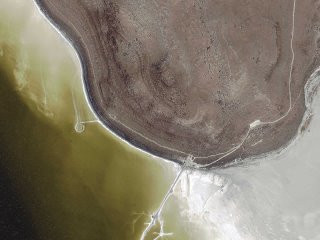
"From the moment the first drop of blood is spilled, the martry does not feel the pains of his injury and is absolved of all his bad deeds; he sees his seat in Paradise; he is saved from the torture of the grave; he is saved from the fear of the Day of Judgment; he marries seventy-two beautiful black-eyed women; he is an advocate for seventy of his relatives to reach Paradise; he earns the Crown of Glory, whose precious stone is better than all this world and everything in
it."
--Sheik 'Abd-Salam Abu Shukheudem quoted in Barbara Victor's *Army of Roses*
“On February 25, 2002, Dr. al-Rantisi stated in an article in the Al-Ayat newspaper, published in London and Beirut, “Suicide depends on volition. If the martyr, whether a man or a woman, intends to kill him or herself because he or she is tired of life, it is suicide. However, if he or she wants to sacrifice his or her soul in order to strike the enemy and to be rewarded by Allah, they are equally considered martyrs. We have no doubt that those carrying out these operations are martyrs.”
-- Ibid.
“Thus at the same time as reaction to traces becomes perceptible, reaction ceases to be acted. The consequences of this are immense: no longer being able to act a reaction, active forces are deprived of the material condition of their functioning, they no longer have the opportunity to do their job, they are separated from what they can do.”
-- from Gilles Deleuze’s *Nietzsche & Philosophy*
This locution may be one of the major investments of the Lebanese war. It can only issue from someone who not only is unaware that he or she is already dead even as he or she lives, but also wants to extend his or her life even into death. Thus the testimony of Bilal Fahs, who drove a car filled with 150kg of explosives into an Israeli convoy on 6/16/1985 at Zahrani, Sayda, begins with the following Qur’anic aya: “And call not those who are slain in the way of Allah ‘dead.’ Nay, they are living, only ye perceive not” (Qur’an 3:169), and Sana’ Muhaydli says in her testimony: “I am not dead, but alive amidst you…” Notwithstanding over a hundred thousand dead in the years of war and civil war, the Lebanese seem not to have learned to die. Therefore, one of the great tasks of art and writing in Lebanon for the foreseeable future is to teach this people famed for being ‘life-loving’ to die, that is that they are already dead.
-- from Jalal Toufic’s *(Vampires): an uneasy essay on the undead*
“So the camera is moving as an eater of space, or a representation of space, and it is leaping in time. And the effect is that this is an amalgam of many walks, many men.”
-- Stan Brakhage on Maya Deren in *Film at Wit’s End*
Vengeance, the indefinite par excellence, here becomes a circle, therefore contained; with the consequences that guilt is as it were done away with, since we are dealing with a series of reactions with no initial action. Yet guilt is not really addressed and mitigated through recourse to either this perfect circularity where the constitutive injustice in the realm of the dead – due to the blindness of the vengeance of the shards of the minds of the dead – is occulted; or to ignorance, which is the result of self-interest (one is guilty of one’s ignorance). Indeed, what most often occurs as a result of the attempt at expunging any trace of guilt through a perfect circularity is the eruption of an unoriginated guilt (“I was guilty, abominably, intolerably guilty, without cause and without motive:”), the constitution of a vicious circle of a guilt that “demanded punishment… [which] consisted, fittingly enough, of being guilty.” One can be truly innocent only after confronting the aforementioned two guilts and even if one cannot extricate oneself from them.
-- from Jalal Toufic’s *Forthcoming*
*
The Lazarus Girls Dance
In that hell that is now – in the now
that is hell –
the now that is / now
and then and after / given as such
to space and time – your patience, our urgencies / your urgencies
She didn’t see – the body she – when she walked in – arrived / and on time yet – for the wind keys
She didn’t see - she yet the / body - as a tunnel - for dreaming - accretes
Undying -
the appearance of love
A fatal grip – of flowers - flowers / have not half-heartedly - fell / to shadow
To shimmey
this key
to Paradise
a key to dreams
This key to shadow - not yet a seizure
of the person - woman, women – not yet and / often
Having not grasped – her death / (yet) a woman – lifting the fatal / needle to not
Hear (the needle) / there is - no / soundtrack / no marks / of
falling
but the fatal / Raga gravel
on this endless path of appear
And mirror
the face
is a mirror – having / (not yet)
grasped - the face
(is) a mirror – suicided
inside
(inside) by her self / in fatal time – to leap - a breaded knife – but not yet / hurt – to repeat and combine
In fatal time - time repeat
And combine
time now – is itself – a / woman
(space) – holding
the key
on / her tongue
suicided – not yet
(by) her beloved / bereft
even – on the lips – of / consequence
her children –
call her the breaded one
A breaded – knife will / not help – your double (time) to kill –
the / key to shattering – and left alone / by these unwilled devices – what / device
left – alone will / accrete – not yet – or not any longer – multiple
Multiply a number of doubles / a number of devils
To accrete - holding the key
In clear shadow – clear shade / of mesh
What veil accomplice – of mesh what / mirror face felt – mirror this - is a song / for all – for no one – (women) suicided / by themselves – and others – binding – dynamite
turns inwardly for time itself
Reacted - and not at all - for time
To accrete
What veil accomplice – what
menace – (not) across / time – any longer
to bear
the longing - and / tears she
is –
compelled / sonambulist – rising by effort
of his limbs
why don’t you just hang / up – evidence – we are not
here – to be born across time
Not substituted – not a
mirror / face – a shattered
mirror – she / is walking
so – to swallow
to surface – what she can not / get – the key
to wind
the key – to wind is death
To Kingdom come / what don’t you get – not
your / death – born witness (martry)
across
unremembered time – the impossible
effort – agility
to climb – stairs and wake
a sonambulist
Waking to
your own death
as it – is not Paradise / delivered upon not arriving / having passed the chance trouble of
your doubles
the shattered mirror / of time – still waiting
Knowing less well – self-reflexive / the double – and her double – astral
or a virtual
corpse – you are not yet / Clear Light
Clear - Light
obscured
light of tunnel – back-tracking
camera
tracking back
Tunnel knowing not well – not / recognizing (the knife) yet – not the / dynamite or key – of plastic / to Paradise – us all
No one
Not the wind - no / one yet divine – not / the staircase (yet) you will / ascend / to descend (the fatal) – Ladder – re-creation / of the whole - world unwoken / world broken
Let us be for the having missed / do for the just missed - justice
the missing
to be just - and the blink
She – can only / catch – a camera
by missing
another – universe
a camera of accretions / substitution –
of the false
face for / another – false face shatter the / mirror in transit trance
Dream entrance a state in this (trance) is he and not / you dead (dream) this (he) dream / this he again
Dream this trance he (is not) yet / dead you - are dead until the end / there must be - another
created picture / picture dynamite stacks – or (the will) we pretend / to sublime melancholy –the figure / not
(in trance) again
Again affirmed / not in trance again
Chants / chance
Affirm
This is not
his will this / is not
your will not yet
To be suicided to be
Or accreted
Multiple -
this condition – our state
of health / leading you
back to you (as you) / (and you)
as him
Now ended
but not there / complete in / shattered accretion
For Maya Deren, for Eva Hesse, Wafa Idris -- 'suicided'?















